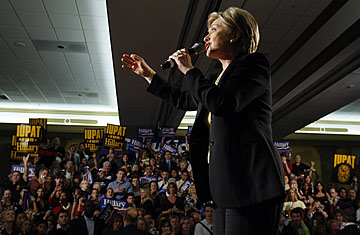
Democratic presidential candidate Hillary Clinton during a campaign rally in Florida in January
Monday's decision by Florida Democrats to abandon their efforts to hold a new primary, in order to get their delegation seated at the national party's August convention, is another blow to Hillary Clinton's attempt to close the small but near-impregnable delegate gap on her rival, Barack Obama. And she's having little more luck in Michigan.
Clinton won January primaries in both states. But since both were held in violation of national party rules, the state parties were told their delegates would not be seated and the races were not officially contested. (Obama even pulled his name off the Michigan ballot.) Now, however, Clinton sees the two states as key to her flickering hopes of catching Obama. The Illinois Senator, unsurprisingly, has opposed any revote or reconsideration of the January results in either state, though his campaign is open to a neutral solution that would give each candidate half of the states' delegates — a solution that would effectively have no impact on the outcome.
With just a handful of contests left on the nominating calendar, Clinton needs all the opportunities she can get to pick up delegates, and thus she has supported either counting the initial results or, alternatively, holding new votes. She is also hoping that her clean wins in the two important states would buttress her argument that her victories over Obama in most of the nation's largest states suggests she would be a stronger opponent against the Republicans' presumed nominee, Arizona Senator John McCain.
Last week, there were signs Florida might provide an opening for Clinton. Florida's Democratic chairwoman Karen Thurman floated the notion of holding a new election that would meet the national rules by having the re-vote primarily through mail-in ballots. But many key state leaders opposed the method as unfair and impossible to pull off by a June deadline. Thurman herself acknowledged as much when she introduced the plan, and on Monday she pulled the plug.
Clinton's only hope now in Florida would be for the national party's credentials committee, which meets later this year, to change course and count some or all of the delegates elected in January. But most Democrats — and even some of Clinton's supporters — believe this is unlikely.
Both Florida and Michigan are struggling to get their delegates seated because they violated the national party's attempt to impose order on the nominating process by mandating that any state not authorized to hold its delegate selection contest before February 5 would be subject to penalties if it moved earlier. In both states, officials tried to call the national party's bluff and moved their votes to January; the Democratic National Committee responded by taking all of the delegate votes away from the two mega-states that are hugely important general election battlegrounds.
In Michigan, legislators on Monday were trying to fashion a plan for a new election that would pass muster with the state party, the legislature and — importantly — both presidential campaigns. Democratic National Chairman Howard Dean has made it clear that any plan for a new vote in either state would need the endorsement of both Obama and Clinton. But Michigan is reportedly having trouble coming up with a solution that could gain enough support in the legislature, and with the Obama campaign as well.
The Obama campaign has cleverly slow-walked the debate over the Florida and Michigan primaries, knowing that the clock on their side. With Florida essentially giving up, and Michigan struggling to find a solution, Clinton's time — and options — are fast running out.
